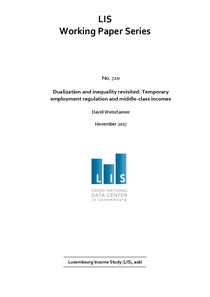Dualization and inequality revisited: temporary employment regulation and middle-class incomes
"What are the consequences of the trend towards more flexibilized temporary employment for income inequality? This paper reassesses the crucial assumption behind the politics of dualization that reforms targeted at outsiders do not undermine the position of labor market insiders. Instead, I arg...
| Main Author: | |
|---|---|
| Institution: | ETUI-European Trade Union Institute |
| Format: | TEXT |
| Language: | English |
| Published: |
Luxembourg
2017
LIS |
| Subjects: | |
| Online Access: | https://www.labourline.org/KENTIKA-19395833124911130159-Dualization-and-inequality-rev.htm |
| Summary: | "What are the consequences of the trend towards more flexibilized temporary employment for income inequality? This paper reassesses the crucial assumption behind the politics of dualization that reforms targeted at outsiders do not undermine the position of labor market insiders. Instead, I argue that deregulated temporary employment exacerbates risk asymmetries among regular workers. Facing high replacement risks and prospective wage losses in temporary employment, deregulation creates wage pressure on middle-income employees. Using Luxembourg Income Study microdata for 22 OECD countries from 1985 to 2014, I show that income shares of the middle and lower-middle quintiles decline under deregulated temporary employment. The findings suggest that flexibilization “at the margins” contributes to rising inequality beyond dualization by causing major distributional shifts among regular workers. This further challenges the view of stable insider coalitions, pointing instead to an opposition potential against flexible employment around middle-class insiders." |
|---|---|
| Physical Description: | 30 p. Digital |

